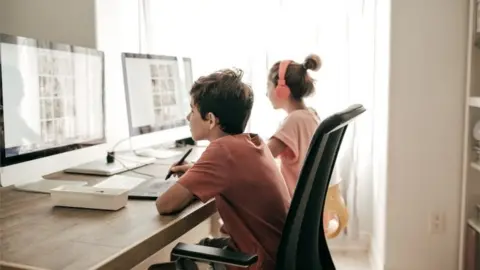Covid-19: Government denies 'snubbing' BT's wi-fi for pupils offer
 Getty Images
Getty ImagesThe government has denied it "snubbed" an offer from telecoms giant BT to provide disadvantaged children with internet access for remote learning.
BT said the government had "struggled to distribute" the wi-fi vouchers and "effectively handed them back to us".
However a spokesman for the education department said a pilot of the scheme had not provided "reliable and consistent" internet connection.
UK schools are closed to most pupils as part of coronavirus lockdown measures.
Teachers have had to revert to online learning, as was the case during the first lockdown in the Spring. However concerns has been raised over how this is impacting disadvantaged families who don't have internet access.
In a letter to BT, Labour MP Sarah Owen urged the company to provide school children "who cannot afford it with internet access so that they can learn, achieve and stay connected".
In response Marc Allera, head of BT's consumer brands division, said: "BT was the first telecoms operator to have an offer for vulnerable families", adding that it had offered BT wi-fi vouchers from June 2020.
"Unfortunately the Department of Education struggled to distribute these vouchers effectively and handed them back to us," he wrote.


The pressure is on both the government and telecoms companies to do more to close the digital divide.
It was while defending its own approach to a Labour MP that BT revealed the free broadband offer it had made to the education secretary.
BT Basic is, as the name implies, a pretty basic service offering a phone line and a 10Mbps broadband service to anyone on Universal Credit or other benefits for £10 a month.
It seems that Gavin Williamson did not find an invitation to subsidise a slow service which would still leave a family struggling to video stream lessons very attractive.
There would also have been competition issues in the use of public money to back a dominant player in the fiercely competitive broadband market.
Nevertheless, having failed to come up with convincing answers to closing the digital divide during last Spring's lockdown, both the government and the telecoms giant are now scrambling to show they can do better this time around.

BT also said it offered to prioritise putting vulnerable families on an "affordable broadband tariff".
"The department declined this route, wanting something faster," he added: "We regret this decision as had the Department for Education taken this approach then many of these families would have affordable and unlimited broadband by now."
BT has said it is now offering "free unlimited" mobile data for families without internet access and that, by the end of the month, it aims to implement zero-rating of popular education websites, meaning children won't lose data when on these sites.
Labour's shadow education secretary Kate Green said it was "shocking and utterly disgraceful" that education secretary Gavin Williamson had "snubbed an offer of cheap broadband for kids".
However, the government said her claims were "completely wrong".
"The department did pilot the BT WiFi Hotspot scheme, but it did not suitably meet children and young people's needs for a reliable and consistent internet connection to access remote education," a spokesman said.
"The families involved reported poor coverage and intermittent connection."
The row comes amid warnings that some schools could be inundated with pupils without laptops during the current lockdown after a change to the vulnerable pupil list.
